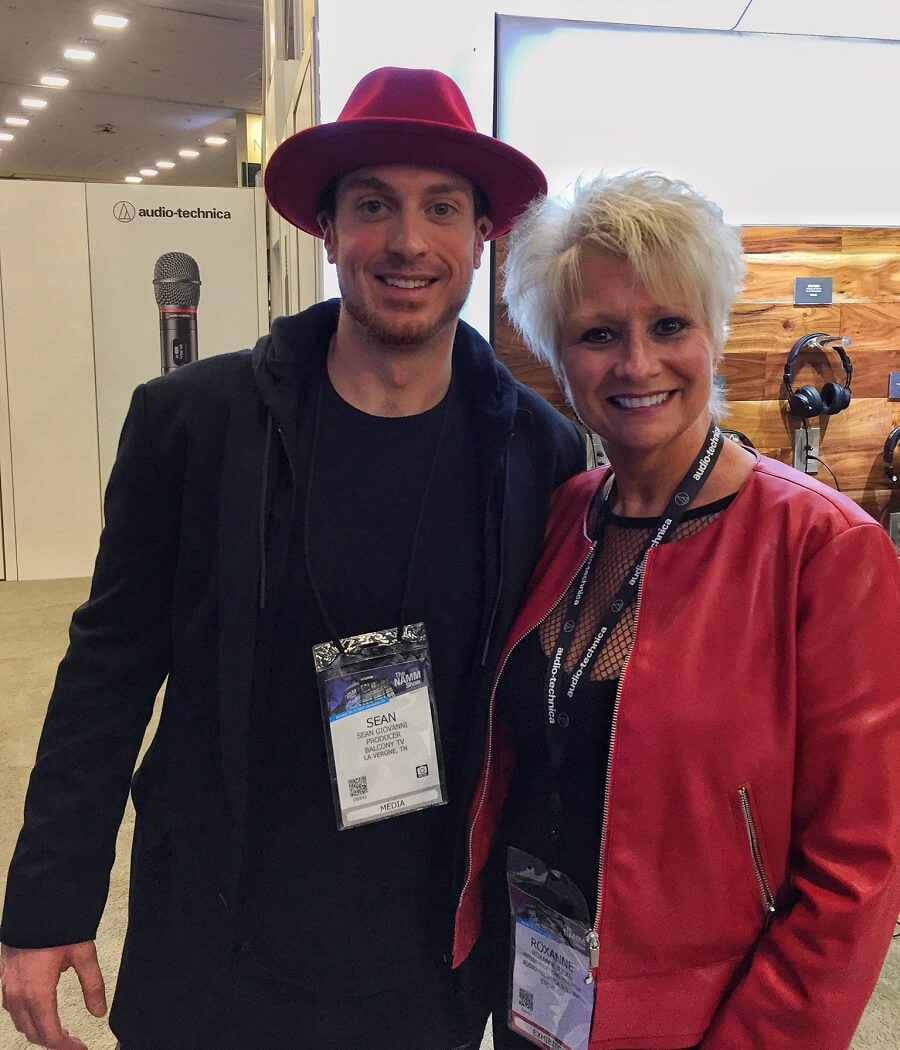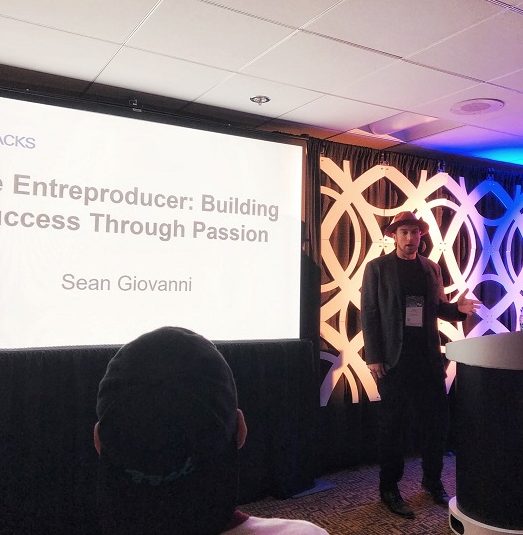Recording mentor Sean Giovanni on Reaching Goals & Building a Purpose-Driven Career

If you’ve been reading our newsletter for a while, you know we’re constantly encouraging our students to hone their abilities to make smart decisions right alongside their artistry and craftsmanship. Having interviewed producer/engineer and Recording Connection mentor Sean Giovanni of The Record Shop (Alabama Shakes, John Legend, Meatloaf, Universal) in Nashville, a number of times before, we decided to pick his brain on a specific topic. “How can adopting an entrepreneurial mindset help our students achieve their goals?”
[break side=”left”]
Turns out, we weren’t the only ones to consider Gio a good resource on the subject. In fact, the day after our face-to-face interview, he delivered a talk at NAMM entitled: “The Entreproducer: Building Success Through Passion.”
[break side=”left”]
Our own resulting interview with the trailblazing producer and entrepreneur was nothing short of remarkable, so buckle up!
[break side=”left”]
How can our students use an entrepreneurial mindset in order to grow their careers, their businesses, or both?
[break side=”left”]
“Where I tell students to start is to define what their purpose is. That’s something that we hear about a lot. There’s a lot of self-help people and motivational speakers that talk about ‘determine your purpose.’ It can sound a little cliché, but it is so intricately important to figuring out your direction with your career. When you have your purpose, you know that you’re meant to do something and you’ve committed to doing it, then it’s so much easier to stay consistent with it. Whenever we have tough times, feel like things aren’t moving fast enough…see other people excelling at a quicker pace and we get burnout or upset by that…we’re able to refer back to our purpose. We’re able to remind ourselves, ‘There’s a reason why I took this path.’
[break side=”left”]
I figured out my purpose was to be able to help artists create a piece of art that would outlast themselves. I found this quote early on in my career by the philosopher William James who says, ‘The best use of life is to use it for something that will outlast us.’ That had a big impact on me. When I was growing up there were all these timeless recordings that inspired me to be a recording engineer and producer. Be part of creating that, because it’s something that can last forever and can have such a big impact on so many different people. So, for me, that’s the thing that inspires me…
[break side=”left”]
The next step after finding out what your purpose is, is to figure out a plan… Goal-setting is extremely important, but a lot of people start with the biggest goals. I did that, too. I had these major goals to achieve, and you’re so focused on the final destination that it’s hard to see the steps that you’re taking and how far you’ve progressed along the way…
[break side=”left”]
So [then] I started…focusing on smaller goals…The first high-end microphone that I bought was a Neumann U87. I looked at what my expenses were to survive. What I needed for rent, food, bills, and how much money I was bringing in. Then, I set aside a certain amount of money every month to put towards that microphone, and eventually I saved up enough to buy it.

[break side=”left”] So in the process of doing that, I said, ‘Okay, well I have this small studio on Music Row which I’m working out of. It’s great for what I’m doing right now, but I can’t really track a full band in there, I can’t produce a major project. So I have to find other studios to do that.’ So my next goal [was], ‘Let’s get to a point where you can afford a lease on a larger property.’ So, I set that goal for myself to achieve within five years. In four years, I got to that point and was able to accomplish that…My next goal within five years was to be able to open up a larger studio with and multiple rooms [so] we could accomplish more. It took a bit longer. I had a five year plan to accomplish that. It felt like a good number to me, but the process took about six years to happen. But I had those steps along the way to help make it happen.”
[break side=”left”] In your opinion, what’s the biggest challenge facing most creatives today?
[break side=”left”] “The biggest challenge that I come across with producers and engineers that are just starting their career, and with artists, songwriters, [and] creatives in general, is that we oftentimes have a hard time balancing our creative aspirations with being a businessperson. In the modern music industry, most of us are going to end up being freelance entrepreneurs. So the word ‘business’ can sometimes be a dirty word to a creative. I like to use the word ‘entrepreneur’ because the idea of an entrepreneur is that they have their own creative direction, they can find their own path. They don’t answer to anyone except for themselves, which is incredible, but it also requires a significant amount of self-accountability in order to achieve at a high level. You don’t have someone that’s on your a_s if you mess up. You don’t have someone to make sure that you’re showing up for work on time every day and that you’re maintaining your schedule and that you’re working as efficiently as you can. You’re the only person that can do that. So it takes a lot of responsibility and commitment to make that happen.”
[break side=”left”] So it sounds like being accountable is key. Do you regularly check in with yourself to see how you’re progressing at meeting your goals?
[break side=”left”] “I’m accountable to myself every day. So before I leave the studio and complete my workday, I go over the list of things that I was supposed to accomplish that day and make sure that they’re all done. If there’s anything that I missed, I make sure that I work on it. I go through all my emails, handle all of the administrative stuff that I need to get done, and make sure that’s accomplished. It feels good once I’ve looked at everything that’s been accomplished that day. And the last thing I do is look at my schedule for the next day, and I visualize my entire day, from when I wake up until I’m going to be going back over the review of my day for the next day. And step by step, I go through that process and I say, ‘Okay, I get up, go through my morning routine of exercise and mindfulness and reading, and then I get into the studio. What’s my first session? What’s my first meeting? What do I need to do to prepare for that? When am I taking a break for lunch to make sure that I’m keeping my body fueled? …My entire day, I have visualized in my mind. And I say, ‘Okay, cool. I’m ready to go.’ That way every morning when I show up, there’s no question. I don’t have to think about where do I start, what do I do? I already know because I played it out in my mind a day before. So I’m ready to go after it.”
[break side=”left”] Does having that discipline actually help free you up creatively?
[break side=”left”] “Yeah. I don’t have to worry about anything because I know it’s going to be taken care of. I’m already on top of it. So rather than saying, ‘Oh, I’ve got to remember to do this thing or that thing,’ I already know…So if I’m involved in the production of something, I am 100% completely focused on that and there’s no distraction.”
[break side=”left”] Learn more about Recording Connection and discover an immersive music production school, audio engineering, live sound, Ableton, beat making and more.
[break]




